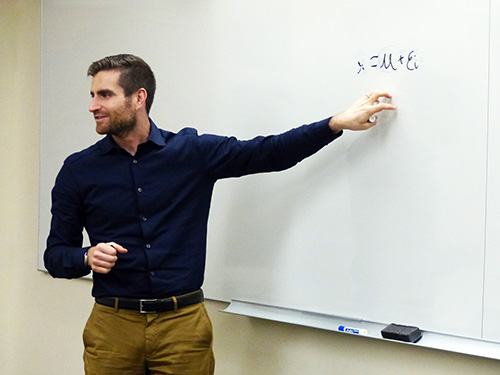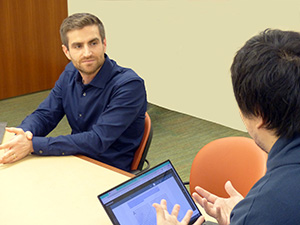On Second Thought: ISPS Faculty Fellow Joshua Kalla Considers How We Reconsider

Joshua Kalla wants to change your mind.
No, that’s not quite right. He is a resident faculty fellow with the Institution for Social and Policy Studies (ISPS) studying attitude change. He is an assistant professor of political science seeking answers, not necessarily specific outcomes. He wants to know how and why people change their minds.
Because — believe it or not — people still do.
Kalla and his co-authors have published studies on how voter outreach campaigns can reduce polarization, when and why political campaigns’ persuasive effects are so small, the effectiveness of TV issue ads, and the negative consequences of informing voters about deepfake videos. Most of his work addresses prejudice. He tries to understand how organizations or political campaigns might change attitudes about a marginalized group, an issue, or a candidate.
We recently spoke with him about his research and teaching to understand what field experiments and other tools can tell us about political persuasion, prejudice reduction, and decision-making among voters and political elites.
ISPS: A lot of your work shows the limits of persuasion to change minds, particularly in our current political climate. Do you find this discouraging?
Joshua Kalla: I think it depends on my mood. There are ways to read my findings that can be pessimistic or optimistic depending on where you are coming from.
ISPS: How so?
Kalla: For example, I’m finding in my research that face-to-face conversations — where someone tries to build rapport and trust — seem to work across different issue domains, including transgender rights, abortion, and immigration. People are changing their minds with the help of very civil, face-to-face interactions. If your initial view is that Americans are set in their ways and polarized, that people aren’t thinking critically or for whatever reason aren’t ever changing their minds about the issues — then I think these findings are encouraging on these deeply polarized, emotionally hard issues.
ISPS: But there is a pessimistic interpretation of the same evidence?
Kalla: I think the more pessimistic spin would be the relatively small size of the effect in these various studies. Somewhere between one out of every 10 or 20 people will change their mind as a result of these conversations. That’s not a big number if the goal is to affect broad societal change. A political group will not be able to have enough conversations.
ISPS: And yet we still need to have them, right? Particularly when it comes to something like reducing prejudice against LGBTQ people.
Kalla: Yes, I would say one answer is to empower people to have personal conversations about the issues that too often divide us. Because the effect is small across a country with 330 million people, we can’t rely on any one approach. There is probably room for public policy. It’s hard to change what happens in someone’s heart. But even if laws can’t make people less prejudiced, good policy can make people less likely to act on their prejudice. Then again, sometimes what it takes is generational change.
ISPS: Has social media — and the data it generates and deploys — changed the way we can evaluate the effectiveness of political messaging on elections?
Kalla: A lot of the research on the effect of advertising on social media or the internet writ large find very small to no effect of that type of advertising. Honestly, I think part of it is it’s so easy to scroll by, tune out, skip it. People aren’t necessarily engaging with that content. Or if they do, they are already in agreement with it. Or they are on the other side and hate-viewing it. It won’t really change minds. But if I show up at your house or call you on the phone, we are going to have a real conversation with a potential to influence your thinking.
ISPS: As an educator, what are your hopes for the next generation of political scientists, politicians, and political operatives?
Kalla: For me, what I think is really exciting is the potential to break down the silos that exist in academic disciplines. I study American politics. But attitude change can apply to French politics, Egyptian politics, Japanese politics. Why are we so focused on what happens here? Is it really distinct from other countries?
ISPS: What about disciplinary differences that go beyond geography?
Kalla: Yes. I find that potential exciting as well. A lot of times sociologists, psychologists, and economists investigate similar subjects but do not necessarily engage with one another. We should find ways to learn from other scientific disciplines and improve on our methods.
ISPS: How so? Can you think of an example?
Kalla: One thing a lot of economists do is they have these structural models. Of an economy, campaigning, decision-making. They will conduct experiments and use empirical data to fine-tune parameters of a theoretical model. I think that’s very useful to have that broader model of how we think some component of the world might operate. It happens in political science but not that much.
ISPS: You teach an introductory undergraduate course on data science for political campaigns with a focus on teaching the coding language Python. Why is it important for political science students to understand computer coding?
Kalla: A lot of jobs in the world of politics involve either producing or consuming data. Campaigns, which I am most familiar with, are constantly hiring people with programming and statistics skills. And even individuals who don’t end up doing the coding work or statistical analysis themselves are in a better position to understand the end products. I want to set up students with those skills. Every year I have students who go on to work with campaigns, and they tell me they feel very well prepared.
ISPS: And these skills probably have a broader utility as well, right?
Kalla: Right. They are not unique to politics and campaigns. All sorts of marketing, advertising, and other businesses increasingly make decisions drawn from data. Both because of the growing availability of data and the cheaper and quicker ways to do things with data. With modern computing, we can take advantage of data on a large scale and inform political and business decisions.
ISPS: Another course is about measuring impact and opinion change, which focuses on field experiments. Why are field experiments so useful for understanding political behavior?
Kalla: What’s really exciting about what Alan Gerber and Don Green created within political science is taking this tool from medicine — drug trials — and applying it to politics. A medical researcher might have theories about why a vaccine might work and test it in small trials in laboratory animals. But until we test that vaccine in the real world — give it to many people, see the outcomes, see the side effects — we can’t draw firm conclusions.
In social science we might want to test the effectiveness of a postcard campaign to encourage voting or a job training program to increase wages. We have theories that might work with small data, but they need to be tested in the real world.
ISPS: Why?
Kalla: Human beings are complicated. Life is messy. Things happen we can’t predict or control. How people interact with something we are trying to test needs to account for that messiness.
ISPS: In a working paper with David Broockman that got a lot of national attention last year, you found that incentivizing regular Fox News viewers to watch CNN instead produced substantial learning and moderated their attitudes. Recently, court filings in Dominion Voting System’s defamation lawsuit against Fox News have revealed prominent hosts and the company’s CEO privately disbelieved lies about the 2020 election but aired them anyway for fear of losing their audience. Combined with your findings, what does this say to you about why people watch a certain media outlet and what they will and won’t accept?
Kalla: I think what my research finds is people are fairly trusting of what they see on TV. In that working paper, we took people who are heavy Fox viewers who don’t like CNN much, and after watching CNN they actual learned a lot. They believed what CNN was telling them and believed less what Fox was saying. It speaks to this extreme power. When a cable network talks about something in the world, particularly over days and weeks, people will believe it. Media does have a strong influence in American politics.
ISPS: At ISPS, we seek ways to understand critical challenges in the world and support democratic, data-based solutions. We are nonpartisan. But as an individual, how do you balance the overall mission with your own political beliefs? How can someone be apolitical about politics?
Kalla: The kinds of questions I ask are not questions that are trying to prove one political side right or wrong. I’m trying to understand how people change their minds about these issues. That “how” statement doesn’t have an underlying value as to whether people are changing their minds in a “right” or a “wrong” way. I want to know the how and the why of what causes people to change their minds.
ISPS: I can’t decide what to have for lunch.
Kalla: I wish I could help you with that! When deciding on which research questions to explore, I want them to be something meaty. Not which type of toothpaste people prefer. Something consequential.